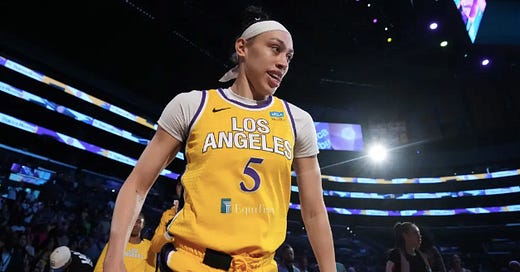The binary outside the body
The discomfort toward women's bodies, choices, and pursuits that Dearica Hamby's lawsuit against the WNBA and Las Vegas Aces lays bare.
What is the value of women, I asked once.
It was a cruel hypothetical, to show how numbers are used for pro athletes (and by sports media, fans, contemporary society) as armament against women at the centre of instances of intimate partner violence, and against women, generally.
In light of Dearica Hamby filing a federal lawsuit against the WNBA and her …
Keep reading with a 7-day free trial
Subscribe to BASKETBALL FEELINGS to keep reading this post and get 7 days of free access to the full post archives.


